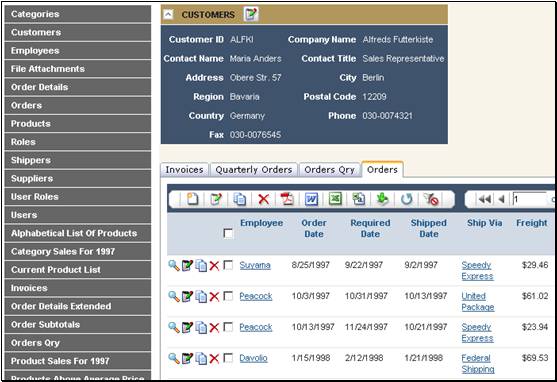Is Hand-Coding Becoming Obsolete?
Is Hand-Coding Becoming Obsolete?
By : Alan Fisher
Increasingly, IT managers, CIOs and software developers are turning to a new approach for rapidly building robust database applications without programming – application generators. Today’s business environment demands managers find ways to do more with less, and application generation allows both developers and non-developers to build applications quickly and efficiently.
What Types of Applications Can You Build?
Application generation tools build database-driven applications that can be deployed to the Web, the Cloud, or to Microsoft SharePoint environments. Like any hand-built application, these database applications are typically used for:
- Data entry and management – collecting and editing data from users.
- Reporting and tracking – reporting, summarizing and visualizing data.
- Workflow and scheduling – automating step-wise business processes.
- Business process automation – orchestrating data flow between multiple systems.
While individual applications may look quite different from one another, these applications usually contain a variety of rich, interactive page types, reports, data import and export features, and integrated application security. Because most business applications are built atop an underlying database, they lend themselves to automated and semi-automated solutions for creating and customizing their Web pages and data access code. Only custom business logic need be added by hand. Moving from the conceptual to a concrete example, let’s take a look at one such tool, marketed as Iron Speed Designer.
The image above shows a typical order management application that was generated by Iron Speed Designer. To develop this application, you begin with a simple application wizard to create a fully functioning Web application based on your underlying database. This application can be deployed “as ism” or further customized using an intuitive page layout spreadsheet and simple Microsoft Excel-like formulas to add custom logic. Data elements, and even entire panels and charts, can be dropped from the Iron Speed Designer toolbox onto the layout spreadsheet. Since Iron Speed Designer understands the relationships in the underlying database, no programming is required.
Since the tool includes a wide variety of professionally-designed page styles, you won’t need a graphic designer to make your Web applications look good. You can customize these styles, or create your own to maintain your standard corporate look and feel. One significant advantage of these tools is they frequently add a bevy of sophisticated features to your application that would have taken weeks or months to build by hand. These features give your application a level of polish lacking in most custom applications. Reporting, data import and export and application security are commonly included features. For example, you can export formatted data directly to Microsoft Excel for further analysis and reporting, as shown in the image below.
Application Generation Yields Huge Savings
How well does the application generation process work? An analysis of Iron Speed customer applications indicates they save an average of 19 person weeks and $37,000 of development costs per application. In short, these tools could pay for themselves in one application.
Even non-developers can build applications in just a few hours or days, rather than weeks and months, all without programming. Individuals, and small teams of just a few people, can out-produce entire development teams. Moreover, corporate managers don’t have to pay steep internal transfer costs, which are frequently charged by their regular development organizations. Some key benefits of application generation tools include:
- Reduced software development costs. Applications can be developed and deployed faster and more efficiently with less cost in human resources. Proof-of-concept systems can be rapidly built, feedback gathered, and quickly modified.
- Consistent look and feel. Generated applications have highly consistent and professionally designed user interfaces, giving applications a finished look and feel, even at the prototype stage. A consistent look and feel across applications reduces end-user learning curves when assimilating new applications.
- Simplified application maintenance. Generated applications follow a highly consistent architecture, allowing any developer to maintain any application. There is little or no ‘ramp up’ time necessary for one developer to maintain another developer’s application because the architectural knowledge transfers from one application to another.
While traditional software developers may believe that machine-generated applications can’t possibly be as good as their own hand-written code, in most cases upper management will opt for quick standardized development at minimal cost rather than pay for time-consuming customized perfectionism. The time and cost savings of application generation tools are simply too significant to ignore, and most functional area managers prefer solutions that make their end-users productive and satisfied as quickly as possible.
Many of us hardened programming veterans remember the cumbersome fourth generation languages (4GLs) of the 70s and 80s, which were advertised as bringing in the new age of programmer free application development. We also remember the second phase of 4GLs, released in the 90s, that focused on end-user development and many times created more problems than they solved. Thus, we may be reluctant to even consider the “new and improved” application generation tools. But, like the modern tools found in home improvement stores, improved technology has brought many application development tools that simply make the job easier. If you would like information on one of the most current application generation tools, you may want to visit http://www.ironspeed.com, or other similar Web sites, that can further explain how these tools can help you increase your credibility and performance as a professional application developer.
For Further Information
For further information, please contact:
Lauren Barraco
Marketing Assistant
lbarraco@ironspeed.com
+1 408.228.3437
Alan Fisher
Iron Speed Co-founder
afisher@ironspeed.com
+1(408) 228-3403
Article appears by kind permission of IronSpeed


